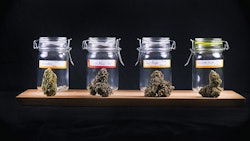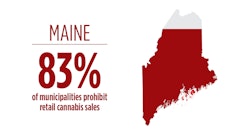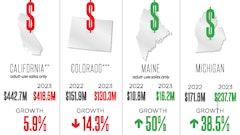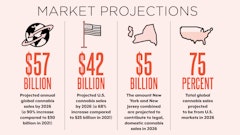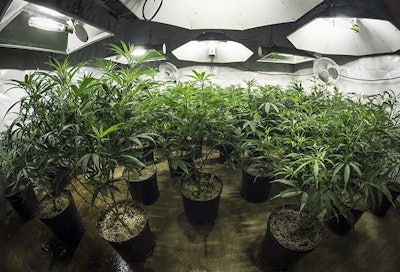
Maine’s Marijuana Legalization Implementation Committee voted Feb. 23 to send a new bill to the state’s legislature to implement a sales and regulation system for adult-use marijuana, with significant changes made to the 2016 voter-approved initiative to gain more support.
Gov. Paul LePage vetoed an adult-use implementation bill, and the legislature sustained that veto last fall. In LePage’s veto letter, he outlined the need for more harmonization between the state’s medical and adult-use programs, as well as the federal government’s stance on marijuana, as reasons for his veto.
“Right after that veto letter … is when Jeff Sessions made that announcement [that repealed the Cole Memo], so we think [LePage will] veto [the new implementation bill],” said David Boyer, Maine political director for Marijuana Policy Project (MPP). “It’ll be close on the override. And then we have our hesitations about if he’ll even do anything if we do … pass it and override him."
The committee has been working on new legislation that Gov. LePage and House Republicans can tolerate, but Boyer said MPP is not happy with some of the changes made to the original voter-approved initiative.
“We couldn’t override the veto, and so the committee came back together in January, tried to hear concerns from different stakeholders, including those who voted against it, [and] they made some changes to the bill—some that we aren’t too happy with, to be honest,” he said. “They [reduced] the adult-use home cultivation plant limit from six to three from the initiative … and then they also completely got rid of the social club licensing.”
The inclusion of cannabis social clubs in the previous ballot initiative was part of the reason the vote to legalize adult-use in Maine was so close, Boyer added.
“We feel voters knew what they were getting in regards to that,” he said.
Maine lawmakers want to be slow in their rollout of the adult-use program and removing social club licensing from the new implementation bill was a way to “make it palatable,” Boyer said.
“Social clubs are a newer thing, and there’s not another state to look at,” he added.
There is no state-mandated cap on cultivators or retailers in this version of the bill, which MPP is satisfied with, Boyer said. “That was how it was in the last iteration, but we’re glad that’s remained—that there’s opportunity for a robust market once the market exists.”
The bill’s final text will be written now that the legislation has passed out of committee.
“They voted on a series of bullet points, so to speak, so we’re waiting on the text of the bill now to know if we’re going to support it, oppose it or be neutral,” Boyer said. “Right now, we’re leaning neutral because we see the importance of getting a regulated market up and running, but we’re pretty disappointed about some of the changes that were put in there to try to get this to pass. We can see both sides.”
If the legislation ultimately passes the state’s legislature, rules will be written and approved by lawmakers, likely in next year’s session, Boyer said.
“After it passes, then some rulemaking has to happen, and those rules have to be approved by the legislature. So, that will be next year, and maybe we could have stores by the end of 2019 if it’s a priority for the next governor,” he added. LePage is term-limited and cannot run for re-election this fall.
“It would be a pretty big letdown to make some of these compromises in this bill only to have it not go anywhere afterwards, until the next governor,” Boyer said. “It’s going to be a while, unfortunately, here in Maine before we’ll have rec stores. And that only hurts the consumers, it hurts the patients and it helps the illicit market.”
Top photo courtesy of Adobe Stock










